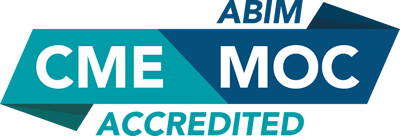
COURSE CREDITS & HOURS
14 AMA PRA Category 1 Credits™14 ACPE Credits
14.0 Contact Hours
14 (part II) MOC points in medical knowledge in the American Board of Internal Medicine's (ABIM) Maintenance of Certification (MOC) program
6 Hours of Pharmacology for NPs
COURSE FEES
TARGET AUDIENCE
PROGRAM PURPOSE
- Osteoporosis
- Evaluate screening recommendations and apply them to everyday practice
- Utilize therapies that include bisphosphonates, PTH and inhibitors of the RANK/RANKL/OPG system
- Review the current controversies and clinical studies regarding Vitamin D
- Better advise patients on calcium supplementation
- MCI and Alzheimer's Disease
- Define Mild Cognitive Impairment in both amnestic and non-amnestic disease states
- Understand the potential implications of early diagnosis of dementia for patient care outcomes
- Describe the clinical manifestations of Alzheimer's disease
- Evaluate patients for symptoms of cognitive and functional loss
- Apply appropriate drug and non-drug interventions for patients with dementia
- Counsel families and caregivers at all stages of disease
- To Sleep: Perchance to Dream
- Describe the age-related changes in sleep
- Evaluate the psychiatric, medical, and neurological causes of sleep problems
- Implement office-based and objective methods for evaluating sleep disordered breathing
- Intervene with appropriate treatments for complaints of insomnia including CBTI as first line guideline directed care
- Management of Constipation
- Understand the common barriers that hinder the optimal management of chronic constipation in health care settings
- Define primary as well as secondary causes of hypertension in the older adult
- Provide a rational strategy to manage constipation based on current best evidence of the drug classes currently available
- Where Pain Management Meets Addiction Medicine
- Understand the pathogenesis of pain
- Apply recent guidelines in pain management including calculations for Morphine Milligram Equivalent Units
- Choose appropriate drug therapy and multimodal interventions for the relief of pain
- Consider the metabolic breakdown of different narcotics and their contribution to serotonin syndrome
- Employ newer tools to determine the potential for opioid dependence
- Pulmonary Disease in the Elderly
- Evaluate current trends in pulmonary disease in the elderly
- Review current immunization guidelines and supportive therapy
- Include new therapies like LAMA/LABA combination inhalers and roflumilast in the management of COPD
- Implement the appropriate use of nebulizers, MDIs and oxygen
- Apply guideline directed care to patients with COPD
- Nutritional Supplements: When East meets West
- Understand that adequate nutrition is a prerequisite for the maintenance of good health and optimum efficiency
- Find the on-line resources that provide the best evidence in support of dietary and nutritional supplements
- Identify targeted supplements for heart disease, vision, depression/mood, and urologic disorders
- Council patients on the risks of certain therapies in the presence of other disease
- Improve your working knowledge of the Mediterranean diet
- Critical Review of the 2016 Surviving Sepsis Campaign
- The Surviving Sepsis Campaign was recently updated. Realize the important points that impact patient care.
- Fungal Infections in the ICU
- Currently different organizations vary in their recommendations on when to use the available anti-fungal therapies.
- ARDS Clinical Update
- Upon completion of this lecture, clinicians should be able understand and implement cost effective infection control measures in their practice.
- Management of Embolic Stroke
- Currently different organizations vary in their recommendations on treatment of CVAs and related complications.
- Critically review the management of acute embolic strokes.
- Infection control practices in the ICU: What is the evidence?
- Upon completion of this lecture, clinicians should be able understand and implement cost effective infection control measures in their practice.
- Critical Care Controversies: Transfusion in the ICUs
- Identify the appropriate transfusion trigger in the critically ill and the risks associated with transfusion.
- Also discussion transfusion practices for massive transfusions.
- Ethical cases in the Critically III
- Understand how to best integrate non-standard advanced directives into the care of critically ill patients.

































